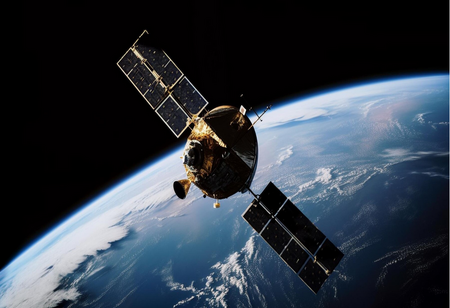Elon Musk's Starlink set to Acquire License for Satcom ops
By Consultants Review Team
 According to officials, Elon Musk's Starlink will be given the go-ahead to provide phone and data communication services from space in the country since the government is satisfied with its responses on data storage and transfer rules. "Starlink's responses to our questions appear adequate... After the security assessment, the company will be granted a global mobile personal communication by satellite services (GMPCS) license to provide services, according to a government official.
According to officials, Elon Musk's Starlink will be given the go-ahead to provide phone and data communication services from space in the country since the government is satisfied with its responses on data storage and transfer rules. "Starlink's responses to our questions appear adequate... After the security assessment, the company will be granted a global mobile personal communication by satellite services (GMPCS) license to provide services, according to a government official.
The license will allow Starlink, a subsidiary of SpaceX, to provide satellite broadband, voice, and messaging services to businesses and individuals alike. ET has reported that Starlink was required to provide specific answers to questions about data storage and transfer after its previous filings failed to satisfy the authorities. Starlink had previously told the government that because its constellation was worldwide, it would adhere to international data storage and transmission standards. The Indian government rejected this viewpoint, requiring Starlink to follow Indian data storage regulations.
"Data must be stored in India because the company will have a license here." "The company has now agreed to comply," said a second official. A query submitted to Starlink about its submission to the Indian government went unanswered at the time of publication. If approved, Starlink will be the third company to receive a GMPCS license, following Bharti-backed OneWeb and Reliance Jio's satcom unit. Amazon, led by Jeff Bezos, has also sought for a license from the Department of Telecommunications (DoT), but its application has yet to be taken up for debate by the government.
Satcom service providers must also obtain permission from the Indian National Space Promotion and Authorisation Centre (IN-SPACe), an autonomous space regulator. IN-SPACe has been enabled by India's new Space Policy 2023 to function as a single-window body to authorize a wide range of space activities by both government and private satcom entities. Following that, firms must wait for the DoT to allocate spectrum.
The government is awaiting Telecom Regulatory Authority of India (Trai) recommendations on how to allot spectrum, or radio frequencies, for satellite services in the country. However, an official stated that the proposals are unlikely until Trai has a new chairman.
This is SpaceX's second effort to break into the Indian satellite communications industry. It was obliged to repay pre-booking money to applicants in the country last year after the DoT instructed it to first seek regulatory clearances.
OneWeb (which recently merged with France's Eutelsat) and Jio are attempting to offer services swiftly to get a first-mover advantage over competitors such as Starlink, Amazon, and Tatas in the embryonic India satcom industry, which has significant growth potential. According to EY-ISpA research, India's space economy will reach $13 billion by 2025, rising at a CAGR of 6%.




